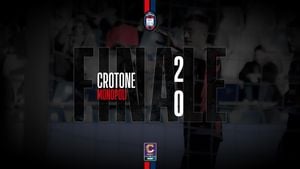A recent meeting between Jordan Bardella, the president of the National Rally party, and Amichai Chikli, the Israeli Minister for Diaspora Affairs, held at a convention for conservative activists in Washington, D.C., has stirred significant diplomatic controversy and drawn sharp criticism from French officials.
The exchange, which involved discussions on Franco-Israeli relations, the challenges of combating Islamic terrorism, and rising antisemitism, has come under scrutiny largely due to Chikli's inflammatory remarks made just days prior, where he called for the closure of the French consulate general located in Jerusalem.
French Foreign Minister Jean-Noël Barrot expressed outrage over the meeting, emphasizing the timing and the perceived betrayal of French diplomatic interests. "A great lesson in patriotism (and diplomacy): 2 days after Amichai Chikli called to close the French consulate general in Jerusalem, Jordan Bardella came to shake his hand," Barrot stated, showcasing the diplomatic tensions ignited by the encounter.
The backdrop of this meeting is complex. Chikli has been vocal about his discontent with French diplomatic practices, particularly accusing the consulate of enabling actions he believes support terrorism, and criticizing visits by French diplomats to East Jerusalem neighborhoods, which he claims incite violence and compromise Israeli sovereignty.
Chikli’s stance has not only put him at odds with French authorities but also highlights the often complicated and contentious relationship between France and Israel, especially concerning issues surrounding the Israeli-Palestinian conflict. His calls for action against the French consulate signify not only personal grievances but broader political ambitions to assert stricter Israeli nationalism on the international stage.
The backlash from Barrot is indicative of frustration within French politics, particularly among centrist and leftist factions, who are wary of the rising far-right influence represented by Bardella's National Rally. The party has gained traction over recent years, leveraging nationalist sentiments and capitalizing on the dissatisfaction of voters concerned about immigration and national security.
Jean-Noël Barrot, speaking on the sensitivity of the issue, noted the importance of maintaining diplomatic channels, particularly between France and Israel, two nations with longstanding historical ties. The criticism from Barrot signifies not only defense of French diplomatic integrity but also serves as a warning against the far-right's growing influence on foreign policy discussions.
Despite the controversies, the meeting has also underscored the necessity for open dialogues on prevalent issues, including the rise of antisemitism and the operational strategies to counteract terrorism. These discussions, albeit controversial and politically charged, explore the avenues for cooperative efforts against common threats.
Chikli's assertions about French actions potentially inciting violence raise questions about the manner in which foreign nations engage with contested regions. Both officials navigated their positions carefully, addressing these concerns during their meet, albeit within the volatile framing of national identity and security.
This encounter holds nuanced implications for both Bardella and Chikli as they forge their paths within their respective political climates. For Bardella, the meeting with Chikli aligns him with far-right international figures, potentially bolstering his party's nationalist agenda at home.
Chikli, on the other hand, may seek to use this appearance to strengthen his own political capital within Israel, positioning himself as a staunch defender of Israeli interests, especially concerning foreign diplomacy. His historical criticism of French initiatives provides him with leverage as he appeals to more hardline elements within Israeli politics.
This incident exemplifies the fraught dynamics of international relations, especially as domestic politics increasingly influence diplomatic engagements. The tension following Bardella and Chikli’s meeting poses significant challenges for French-Israeli relations moving forward, amid heightened sensitivity concerning national identities and external influences.
The future of Franco-Israeli diplomacy hangs delicately on balancing the historical ties and mutual interests against the backdrop of rising nationalism and the calls for re-evaluated foreign policy. With figures like Bardella and Chikli at the forefront, the charged atmosphere will likely define the interactions between France and Israel, as both countries navigate their unique political landscapes.



